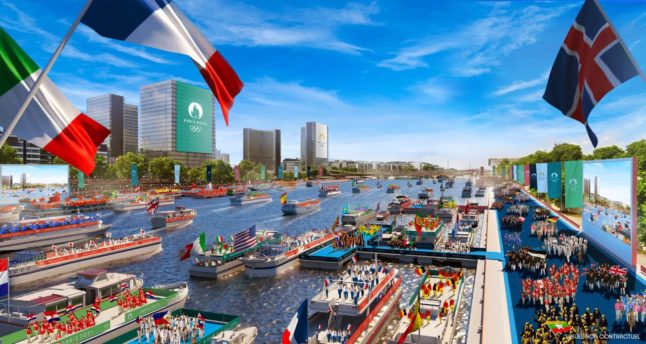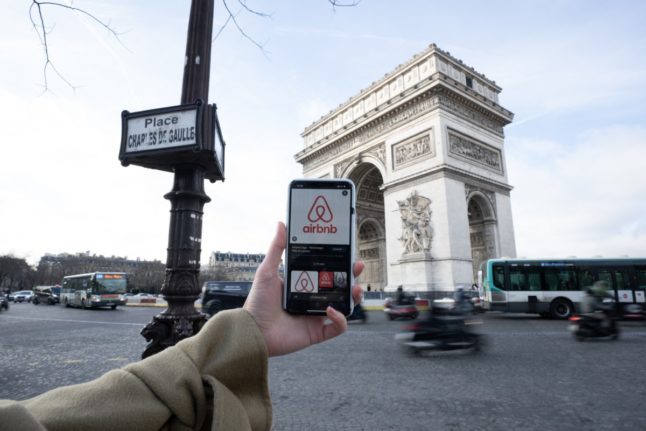In 100 days the most ambitious, spectacular and telegenic opening ceremony in the history of the Olympic Games will take place on the River Seine in Paris.
There will be 94 barges with actors, dancers and 10,000 athletes from almost every country in the world.
Or maybe not.
On Monday, President Emmanuel Macron conceded what has been obvious for some time. Such a ceremony, with 320,000 spectators occupying both banks for six kilometres from Austerlitz to Trocadero, will be a logistical and security nightmare.
France is involved, tangentially and directly, in two wars. Its terrorism alert is already at its highest possible level. Whatever happens in Ukraine and Gaza in the next three months, the Paris Olympics and Paralympics from July 26th will be a tempting target for Islamist extremists and for the criminals in the Kremlin.
In an interview with BFMTV, President Macron said that the government and the Games organisers were working on possible Plans B and C. If the terrorism threat is judged to be unacceptably high this summer, the floating parade of dancers, singers and national teams will be abandoned.
The alternatives will be b) a much smaller river ceremony between Trocadero and the Eiffel Tower or c) a banal stadium event at the Stade de France.
Macron insisted that, if at all feasible, the river jamboree will go ahead. “We want the ceremony to as beautiful as it can be,” he said. “We want to show the very best of France.”
Fair enough. Not everyone cares for the Olympics as a sporting event.
Who is favourite to win the synchronised swimming this year? Or the poodle clipping? (Sorry, that was in the 1900 Paris Olympics but has never been revived.)
The opening ceremony is a chance for the host country to dazzle and to impress. It is the one part of the 2012 London Olympics that most people remember.
The French organisers decided that the star of the Paris Olympics should be Paris. The back-drop of the opening ceremony would not be models of Notre-Dame, or the Louvre, or the Eiffel Tower. It would be the real thing.
A couple of swimming events will (sewage permitting) will take place in the river Seine. Some events, such as fencing and taekwondo, will be fought out under the enormous, glass roof of the newly restored Grand Palais on the Champs Elysées.
Terrorism or no terrorism, bringing the Games into the heart of one of the densest cities in the world has proved to be problematic.
The swimming events in the Seine will have to be transferred if the river falls below the standards laid down by the 2006 European Union bathing directive. As of last summer, all 14 testing points within the city boundaries exceeded the maximum permitted limit for concentrations of E.coli.
READ ALSO Will the Seine really be clean enough to swim in?
New sewage pipes and treatment works are under construction. President Macron and the mayor of Paris, Anne Hidalgo, have promised to show the way by jumping into the river this summer.
There was a huge row last year when it was announced that the second-hand book sellers, Les Bouquinistes, would be made to remove the book stalls which have been fixed to the walls of the Seine embankments for almost four centuries.
That officious plan was abandoned. There is still, however, an unresolved dispute over attempts to tow away Seine house-boats to make room for the Olympic procession.
Residents of a large swathe of central Paris, from the Arc de Triomphe in the west to the suburban town of Evry in the east learned last week that, for a week in late July, they will need a QR code to walk in the street near their homes. The same will apply to the tourists. They will need a QR code to visit the Champs Elysées or the Arc de Triomphe and the Seine quays.
Factcheck: Which areas in Paris will be closed during the Olympics
These clumsy and tyrannical rules will apply for a week before the opening ceremony on the river on July 26th. The code is available on application on-line to the Securité Internationale et Lutte Contre le Terrorisme (SILT) system which will be set up by the Ministry of the Interior. Anyone suspected of being a security threat will be refused.
Originally, it was promised that converting the Seine into an amphitheatre would allow up to two million people -equivalent to the whole population of the city – to watch the ceremony for free. The possible attendance was then reduced to 500,000; and now 222,000.
Don’t fancy queuing for a free spot? Don’t worry. Another 100,000 people will be accommodated on the lower Seine quays – for €1,600 to €2,500 a seat.
The waterborne opening ceremony was dreamed up by a canoeist, Tony Estanguet, a three-time Olympic gold-medal winner, who is now president of the Paris 2024 organising committee. It was ultimately the choice of another President – Emmanuel Macron.
He said in 2021: “When Tony first brought me the idea, I said, ‘that’s crazy. Lets do it.”
Now fast forward three years. The whole thing might be a calamity; it could be a spectacular success; it might not happen at all; any last minute substitute would seem lame.
It was a great thought, Tony and Emmanuel. But maybe, on balance, it was not a very good idea.
If you’re coming to Paris for the Olympics or Paralympics, you can get The Local’s Paris Olympic Guides newsletter, giving you all the latest practical information for your visit – sign up here.



 Please whitelist us to continue reading.
Please whitelist us to continue reading.
Another weird one from Lichfield. Wherein he suggests France should not try for impressive feats because she may not achieve absolute perfection. I’m starting to wonder whether he even likes living here.